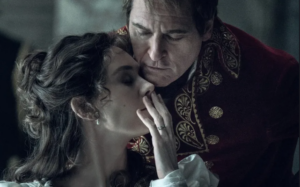NAPOLEON: 3 STARS. “an unexpected portrayal of Napoleon Bonaparte.”
 Director Ridley Scott and star Joaquin Phoenix team to present a portrait of Napoleon Bonaparte you are unlikely to find in any history book. Both epic and intimate, “Napoleon,” now playing in theatres before moving to Apple TV+, chips away at the character’s historical veneer to reveal an insecure, lovesick, petulant, pompous man with an emperor complex.
Director Ridley Scott and star Joaquin Phoenix team to present a portrait of Napoleon Bonaparte you are unlikely to find in any history book. Both epic and intimate, “Napoleon,” now playing in theatres before moving to Apple TV+, chips away at the character’s historical veneer to reveal an insecure, lovesick, petulant, pompous man with an emperor complex.
Covering roughly twenty years, the film begins in 1789 with the beheading of Marie Antoinette, the queen who lost her head during the French Revolution as the people rose up to abolish the monarchy. In the crowd is Napoleon Bonaparte (Phoenix), a young Corsican soldier with a plan to reclaim the port of Toulon by forcing the Anglo-Spanish fleet to withdraw. It is his first great triumph, revealing his strategic genius and setting him on a path to become the Emperor of France. “I’m not built like other men,” he says.
The small man in his ever-present, big bicorne hat has none of the social graces of French aristocracy, but his power gets him noticed by Josephine de Beauharnais (Vanessa Kirby), a widow whose upper-crust husband fell victim to France’s Reign of Terror. For Napoleon, it’s love at first sight, for her, it’s an opportunity that may one day be accompanied by real feelings. “Has the course of my life just changed, Napoleon?” she asks seductively when they first meet.
Despite not being able to produce an heir and very publicly cuckolding her husband, Josephine has a tight grip on Napoleon’s emotions. “You’re just a tiny little brute that is nothing without me. Say it,” she commands as he nods in agreement. Emotionally she is every bit the tactician as her spouse is on the battlefield and Kirby nails both her ruthlessness and her vulnerabilities.
When his dreams of controlling Europe incur massive loss of life on the battlefield, Napoleon finds himself exiled from the country and woman he loves.
It is hard to decipher exactly what Scott and Phoenix had in mind for “Napoleon.” The battle scenes are undeniably epic, shot on a grand scale while retaining the up-close-and-personal horrors of war. The Battle of Austerlitz sequence, in particular, is horrifying in its execution, brilliant in its design. Scott’s camera captures not only the ambush on a frozen lake, but the cunning mind it took to plan and implement a mission of that size. It’s the kind of thing that could reasonably be expected from the director given the subject.
Less expected is the portrayal of Napoleon, which often borders on satire. The obvious cliches are avoided—he is never seen slipping his hand into his coat, for example—but other choices make for choppy viewing. The general who is a strongman in battle, is also played for laughs in several scenes and I can’t figure out whether the humor is intentional or not.
When he flees the French Directory, the staid committee that governed France until November 1799, his physicality and shrieks of, “They’re trying to kill me,” are more Benny Hill than battleground hero. During another kind of battle, a food fight with Josephine, he throws a hunk of meat her way, bellowing, “Destiny has brought me this lamb chop.” Later, he “seduces” his wife with an odd humming sound that is the opposite of sexy.
Those playful, lighter scenes are intermittently entertaining, but feel at odds with the impassive warrior portrayed in the rest of the film. Perhaps the rumored four hour cut, slated to stream on Apple TV+ after the theatrical run, will add more context, but as it is, these scenes give the two-hour-forty-five-minute theatrical cut a choppy, inconsistent feel as its main character flip flops between stoicism, emotional openness and frivolity.
“Napoleon” will not be accused of being a reverent depiction of its subject, but neither will it be regarded as the definitive portrayal.
